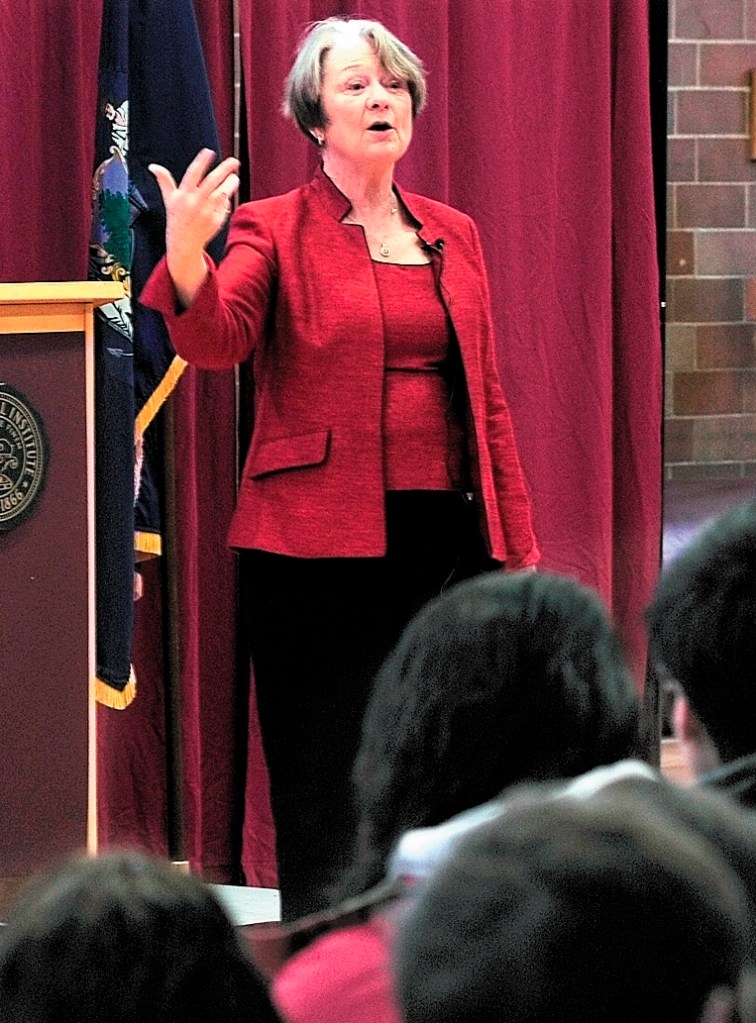PITTSFIELD — Libby Mitchell is retired from politics, but she isn’t shying away from talking about policy and the role of government.
In her first public talk since losing the governor’s race in November, Mitchell addressed hundreds of students in the Parks Gymnasium at Maine Central Institute Wednesday morning. She encouraged them to learn about pressing issues and decide for themselves what should be done.
“You are so empowered to educate yourself about what the real facts are,” she said.
Mitchell, the first woman in the nation to serve as a state’s speaker of the House and Senate president, was at MCI as part of the school’s Patterson Lecture Series to discuss this year’s theme, health and wellness.
She touched briefly on several health-related topics but mostly offered a robust defense of her legislative record while raising concerns about proposals by Gov. Paul LePage and the new Republican majority in Augusta.
After her talk, Mitchell said she’s concerned that the budget cuts proposed by the LePage administration are “on the backs of people in need,” including the poor, retired workers and state employees.
“There will be a major discussion on cutting back on the most vulnerable,” Mitchell said. “What I’m concerned about is, these discussions are happening in a fact-free zone.”
Mitchell, 70, of Vassalboro finished a distant third in the five-candidate race for governor, behind LePage and independent Eliot Cutler. She now practices law as an associate with the firm of Mitchell and Davis in Augusta.
Although Mitchell never named LePage, her talk Wednesday was peppered with criticism of proposals by the administration and Republicans in the Legislature. In essence, she highlighted what she sees as harmful rollbacks of “really important accomplishments we’ve made” on regulations protecting the environment and consumer safety.
She cited LePage’s regulatory reform agenda taking aim at the state’s Kid-Safe Products Act, which aims to protect children from harmful chemicals in products such as sippy cups. “Watch these debates – they affect your lives,” Mitchell said.
Taking an interest in such debates doesn’t come without challenges, she said.
She touted her involvement in the Maine School Breakfast and Lunch Program as an important step toward improving students’ success in the classroom. But, she said, “I got hate mail” about that initiative.
Mitchell defended the state’s health care policies, saying Maine was “ahead of the game” by enacting measures resembling those in the national Affordable Care Act.
Mitchell posed to students a “fundamental policy question,” asking whether they consider health care a “right or a privilege.”
“I came down on the side that it’s a right,” she said.
Saying that many people feel “pretty angry” at government now, Mitchell pivoted to an analysis of “the disconnect people have” in understanding how public policy and government funding affect their lives.
Many people receive government aid, though they may not always think of it, in the form of student loans, Medicare and Social Security. That reality will be thrown into sharp relief with deep cuts expected in the federal and state budgets, she said.
“Frankly, a lot of people have no idea it’s going to affect them personally,” Mitchell said.
Even so, it’s an “exciting time” now, Mitchell told students, because of the coming generation — “young people like you; you are the leaders” — that will decide the future role of government.
After her talk, Mitchell fielded several questions from students. Asked if she could “do over” anything from her gubernatorial campaign, Mitchell said she probably chose “a very hard time” to run because voters clearly wanted change in Augusta.
“I was the poster child for somebody who was in government,” she said, referring to her legislative experience.
Mitchell wished her campaign had better harnessed the Internet and “reached out to young people.”
She also regretted instances in which groups supporting her sent out election mailers that were “painful to me,” and as a publicly financed candidate she could not dictate what such groups did.
Mitchell also recalled her start in the politics — how she ran for an open House seat in Vassalboro as a Democrat — and was elected at a time when voters were frustrated by the Watergate scandal and incumbent politicians.
“I came in on the anti-Washington wave,” Mitchell said. “In a way, I left, 30 years later, on the anti-Augusta wave.”
Send questions/comments to the editors.



Success. Please wait for the page to reload. If the page does not reload within 5 seconds, please refresh the page.
Enter your email and password to access comments.
Hi, to comment on stories you must . This profile is in addition to your subscription and website login.
Already have a commenting profile? .
Invalid username/password.
Please check your email to confirm and complete your registration.
Only subscribers are eligible to post comments. Please subscribe or login first for digital access. Here’s why.
Use the form below to reset your password. When you've submitted your account email, we will send an email with a reset code.